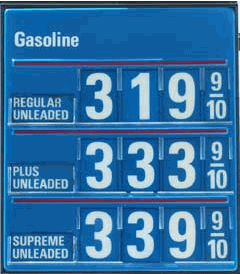Chain of Fools
by Brandon Fuller Did you get the chain email urging you to join the ExxonMobil boycott? If not, here's the letter. Why boycott ExxonMobil? Seedy dealings with corrupt government? Repugnant disregard for the environment? Nope. The chain mailers are simply engaged in what has become a rite of spring in America: whining about high gas prices.
Did you get the chain email urging you to join the ExxonMobil boycott? If not, here's the letter. Why boycott ExxonMobil? Seedy dealings with corrupt government? Repugnant disregard for the environment? Nope. The chain mailers are simply engaged in what has become a rite of spring in America: whining about high gas prices.Are you outraged by the prospect of four bucks per gallon? Well, don't click the forward button just yet. Take a moment to consider the economics behind the chain mail gas proposal. Here's the strategy according to the chain mailers. First, millions of boycotters stop buying gas from ExxonMobil stations. Next, freaked out ExxonMobil executives slash gasoline prices in an attempt to lure back customers. Then, other gas stations freak out too and slash their prices in order to keep their customers from going to ExxonMobil. And, Shazam! We're back to driving our suburban assault vehicles for a dollar per gallon.
Let's give the chain mailers the benefit of the doubt and assume that they can muster the social networking required to pull off a massive boycott of ExxonMobil gas stations. (Successful boycotts typically need an extremely important issue for protesters to rally around.) Ask yourself some questions in order to think about the pitfalls of the chain mail scheme:
1. If, miraculously, lots of people stopped going to ExxonMobil for gas, where would they buy gas? What would happen to gas prices at other stations as people substituted away from ExxonMobil toward other brands in order to comply with the boycott? Would gas prices rise or fall?
2. How long is the boycott supposed to last? That is, how much does Exxon have to cut prices before boycotters can buy Exxon gas and trigger a price war? (Boycotters will have to go back to Exxon to trigger the price war--if other stations knew that no one would buy gas from Exxon, they'd have no incentive to cut their prices.) If ExxonMobil reacted to the boycott by making small price cuts, would some people abandon the boycott early?
3. Suppose ExxonMobil cuts prices by a lot and the boycotters allow themselves to go back to Exxon. Some gas stations might drop prices a bit in order to stem the flow of traffic back to Exxon, but as people went back to Exxon in order to reap the rewards of cheaper gas, what would happen to gas prices at Exxon stations? When the dust settles on the whole boycott would gas prices be any lower than they were before?
4. Ohio State University economist Tim Haab has a message for would-be boycotters who'd like to see lower gas prices: don't drive so much. Listen to his Morning Edition interview on NPR. Who keeps oil prices high: demanders or suppliers? President Bush said the United States has an oil addiction. What energy policies would effectively ween us off of our oil habit?
Want more on the economics of gas boycotts? Check out Tim Haab's blog posts.
Bee County, Texas went so far as to pass a resolution in support of the chain email's scheme.
Jacob Weisberg's Slate column discusses the Congressional stupor created by rising gas prices.
Topics: Gas prices, Supply and demand, Incentive
Labels: Incentives, Supply and Demand



1 Comments:
At 10:22 AM, April 28, 2006, Chris Buzzard
said…
Chris Buzzard
said…
A recent Senate proposal favors a $100 rebate for taxpayers to ease the burden of growing gas costs, while other measures favor "windfall" taxes on excessive oil company profits. Professor Greg Mankiw has an interesting blog post about the $100 rebate proposal. How does the economic rationale of this proposal stack up with the rationale of grass roots boycotts?
Post a Comment
<< Home